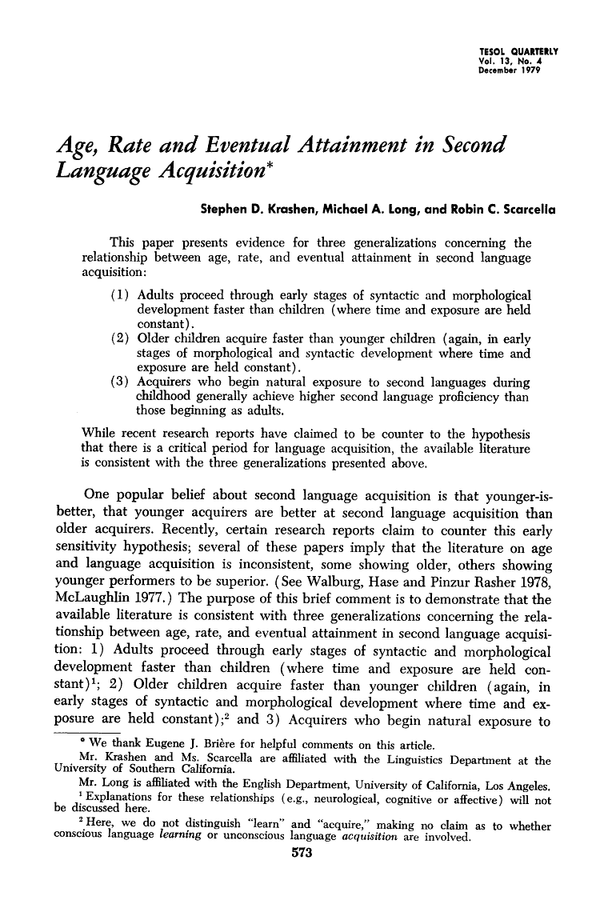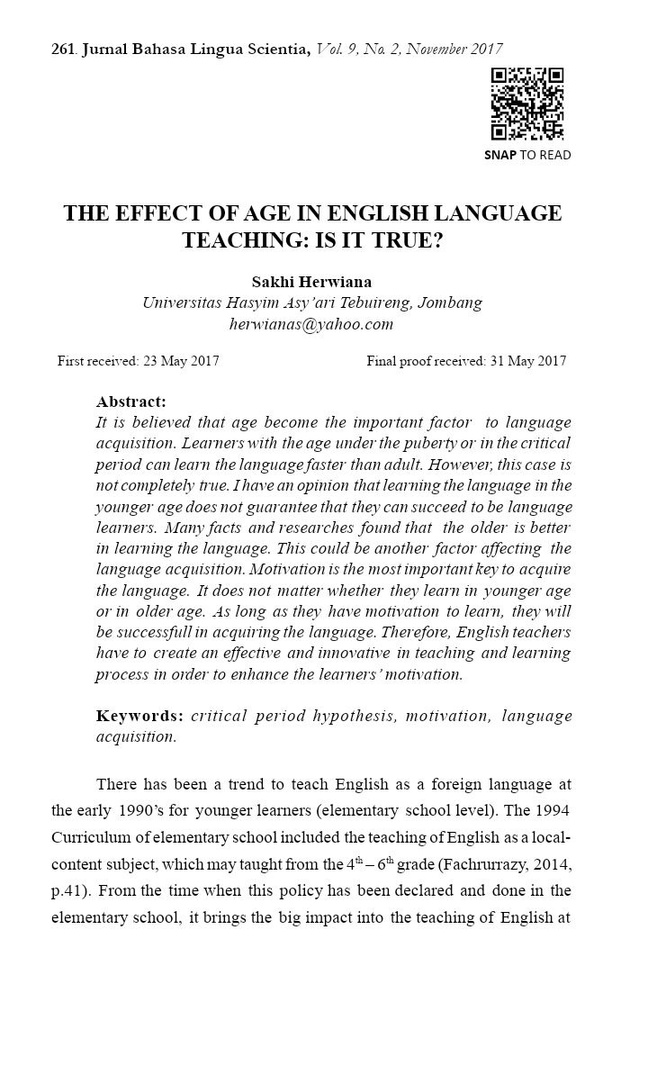portfolio
Age & Language Learning
BLS5023 SECOND LANGUAGE ACQUISITION
SITI NUR KHALIDAH BINTI ROSLI
PBB20008


Bio


My name is Siti Nur Khalidah binti Rosli and I am a degree student in Sultan Ahmad Shah Pahang Islamic University (UnIPSAS). I am majoring in English.
Learning language have been my passion since I was young as I recognized the importance of English as second language. It is like a dream come true when I was accepted to further my studies in English course.
Reference
Age, Rate and Eventual Attainment in Second Language Acquisition
In this journal, Krashen (1979) discusses on evidence to discover the relationship between age, rate and eventual attainment in second language acquisition. Krashen stated that younger acquires second language better than older. Besides that, this journal also discusses on early stages of syntactic and morphological development where adults proceed faster than children. Moreover, Krashen believes that those who have early exposure to second language during childhood, achieve higher second language proficiency than those beginning as adults.
Krashen, S. D., Long, M. A., & Scarcella, R. C. (1979). Age, Rate and Eventual Attainment in Second Language Acquisition. TESOL Quarterly, 13(4), 573–582. https://doi.org/10.2307/3586451

Reference
The Age Effect in Second Language Acquisition and Its Study Design Method
The focus of this paper was the effect of age on second language acquisition. The time when a learner begins to learn a language has an important influence on the outcome of language acquisition. According to Critical Period Hypothesis (CPH), children are obviously superior to adults in second language acquisition. Although early learners are more likely than adults to achieve better results in second language settings, it cannot be ruled out that some gifted adults will eventually achieve second language proficiency equivalent to first language proficiency.
Xu, Liang. (2023). The Age Effect in Second Language Acquisition and Its Study Design Method. Journal of Education, Humanities and Social Sciences. 8. 1215-1222. 10.54097/ehss.v8i.4454.
Reference
The Effect of Age in English Language Teaching: Is It True?
In this journal, Kherwiana, Sakhi (2017) discusses on whether age is an important role in language acquisition or not. Other researcher claimed that learners in the critical time period or with the age under puberty learn language faster than adults. But ffor Kherwiana, Sakhi (2017), younger age does not guarantee it as many facts and researches found that the older the better. it does not matter whether they learn in younger or older age as long as they have motivation.
KHerwiana, Sakhi. (2017). THE EFFECT OF AGE IN ENGLISH LANGUAGE TEACHING: IS IT TRUE?. Jurnal Bahasa Lingua Scientia. 9. 10.21274/ls.2017.9.2.261-280.


DEBATES ON AGE AND LANGUAGE LEARNING
it is believed that age plays an important role in language learning. Generally, people believe that the younger the better to learn language but some researcher conduct experiment to prove this statement and apparently it is not completely true. this is because there are other factor that we need to consider such as motivation and needs. For example, if we expose children with second language during their critical time period but they don't have motivation to learn the language, it will not be fully effective. Meanwhile, for adults who have motivation and needs in learning second language, for example to take MUET to further their studies in university, they might acquire the second language better. To decide whether children or adults are better at learning the second language is quite difficult as children are better in learning it unconsciously while adults outperform children in their ability to learn consciously. Based on the journals that I have read and the theories that I have lerarned I believe children are better at learning second language than adults.
PERSONAL EXPERIENCE
Based on my personal experience, it’s harder for me to learn second language which is English because I was born in a family that communicate fully in Malay. I just got the chance to speak in English and practice my English speaking when I entered primary school. But as the time goes by, I improved a lot in English because it’s not impossible to learn new language even when you’re older as long as you keep on practicing the language. It might not be as flawless and fluent as my first language but it’s quite good and I can use it in my daily life such as during travelling oversea. For me, motivation is really important if we want to do something. As the saying goes, "if there is a will, there is a way". Hence, if we want to be fluent in English we can try to communicate in English frequently with people around us to improve our speaking skills.
OPINIONS ON THE TOPIC
in my opinion, age plays a vital role in language learning. Some researchers might say that children are better at learning second language than adults and otherwise but for me, children are better. It is important to expose the language during the critical time period so that the children can catch up the second language better than children who pass the critical time period. The reason why I said that children are better is they have the ability to learn unconsciously during that time. Besides that, age can also affect elasticity. The younger we are the higher the elasticity and the higher the elasticity of the brain the easier it is to master anything including language learning. In conclusion, age plays an important role in language learning.
ADDRESS
Universiti Islam Pahang Sultan Ahmad Shah (UnIPSAS) Km 8, Jalan Gambang, 25150 Kuantan, Pahang
PBB20008@siswa.unipsas.edu.my
GET IN TOUCH

